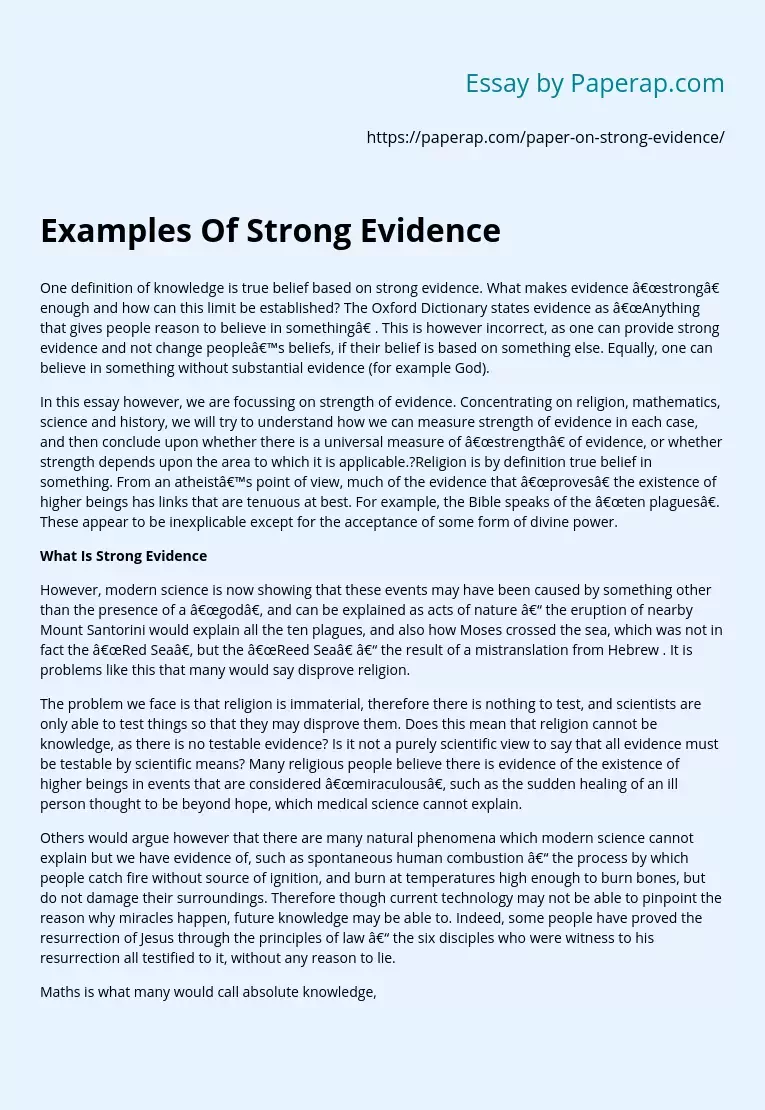Examples Of Strong Evidence
One definition of knowledge is true belief based on strong evidence. What makes evidence “strong” enough and how can this limit be established? The Oxford Dictionary states evidence as “Anything that gives people reason to believe in something” . This is however incorrect, as one can provide strong evidence and not change people’s beliefs, if their belief is based on something else. Equally, one can believe in something without substantial evidence (for example God).
In this essay however, we are focussing on strength of evidence.
Concentrating on religion, mathematics, science and history, we will try to understand how we can measure strength of evidence in each case, and then conclude upon whether there is a universal measure of “strength” of evidence, or whether strength depends upon the area to which it is applicable.?Religion is by definition true belief in something. From an atheist’s point of view, much of the evidence that “proves” the existence of higher beings has links that are tenuous at best.
For example, the Bible speaks of the “ten plagues”. These appear to be inexplicable except for the acceptance of some form of divine power.
What Is Strong Evidence
However, modern science is now showing that these events may have been caused by something other than the presence of a “god”, and can be explained as acts of nature – the eruption of nearby Mount Santorini would explain all the ten plagues, and also how Moses crossed the sea, which was not in fact the “Red Sea”, but the “Reed Sea” – the result of a mistranslation from Hebrew .
It is problems like this that many would say disprove religion.
The problem we face is that religion is immaterial, therefore there is nothing to test, and scientists are only able to test things so that they may disprove them. Does this mean that religion cannot be knowledge, as there is no testable evidence? Is it not a purely scientific view to say that all evidence must be testable by scientific means? Many religious people believe there is evidence of the existence of higher beings in events that are considered “miraculous”, such as the sudden healing of an ill person thought to be beyond hope, which medical science cannot explain.
Others would argue however that there are many natural phenomena which modern science cannot explain but we have evidence of, such as spontaneous human combustion – the process by which people catch fire without source of ignition, and burn at temperatures high enough to burn bones, but do not damage their surroundings. Therefore though current technology may not be able to pinpoint the reason why miracles happen, future knowledge may be able to. Indeed, some people have proved the resurrection of Jesus through the principles of law – the six disciples who were witness to his resurrection all testified to it, without any reason to lie.
Maths is what many would call absolute knowledge, in that it cannot be disproved once proved. However, this is because maths is an abstract concept – 2+2 equals 4 because this is one of the basic premises upon all of which math is based, you cannot therefore disprove it. Mathematical paradigms are established through proofs, which are a series of logical arguments. While evidence can be used to show existence of paradigms, it cannot prove them – they must be shown as true using already established rules and deductive logic (the process of taking already established ideas and building upon them). In the case of Fermat’s last theorem, numerical evidence was given to show it was probably true, as even with computer aid, no numbers could be found to disprove the theory. This however did not constitute a proof, and it took over 300 years from the invention of the theory to its final proof.
Therefore in mathematics, knowledge is not based on evidence, it is based on proof. This does not mean we cannot look at strength of evidence in mathematics. Evidence is used to show theories which might be true, and in this case, strength of evidence is purely based on amount – the more examples you can give where the theory works, the stronger the evidence.Science is in essence a series of ideas and disproof’s – one has an idea, one shows it fits certain patterns, and that idea holds true until it is disproved. It is therefore unlike mathematics in that proven theories can later be disproved.
It is also important to note that theories may be used which are known to be incorrect, but work for many examples. This is due to a lack of a better theory to explain behaviour. For example, the model of the atom with its orbiting electron’s cannot work, as a moving charge would produce a magnetic field, taking away the electrons energy and eventually stopping it. This does not happen, however we stick to this model as evidence shows it works with most cases.
Examples Of Strong Evidence. (2019, Dec 05). Retrieved from https://paperap.com/paper-on-strong-evidence/

